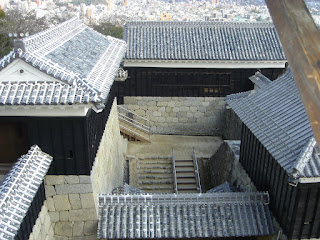
A kadomatsu (literally "gate pine") is a traditional Japanese decoration of the New Year placed in pairs in front of homes to welcome ancestral spirits or kami of the harvest. They are considered temporary housing for kami and placed in front of this Castle, too.
Designs for kadomatsu are typically made of pine, bamboo, and sometimes ume tree sprigs which represent longevity, prosperity and steadfastness, respectively.
The fundamental function of the New Year ceremonies is to honor and receive the deity, who will then bring a bountiful harvest for farmers and bestow the ancestors' blessing on everyone. Click here for a bigger photo.
Happy New Year!

























